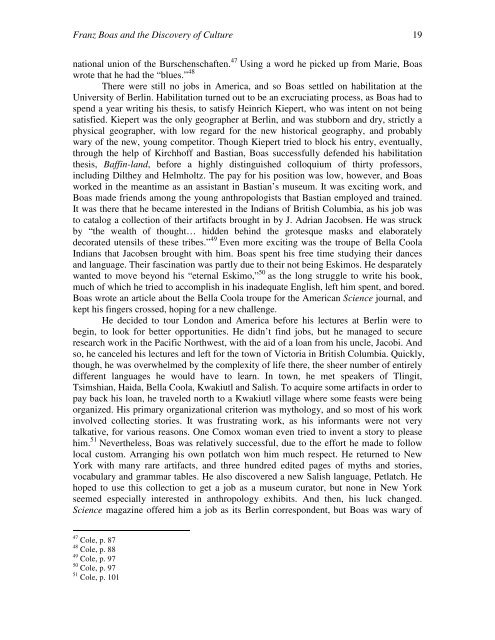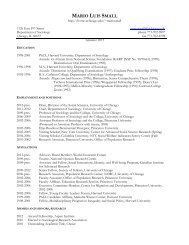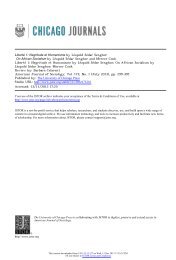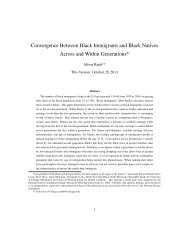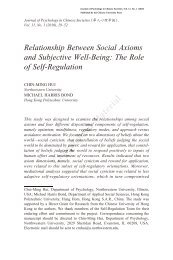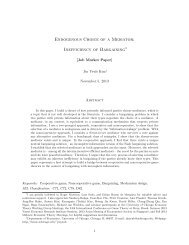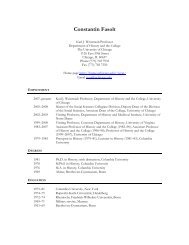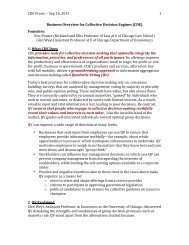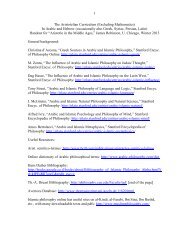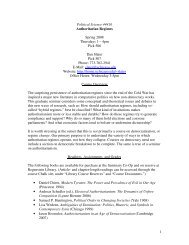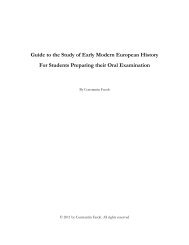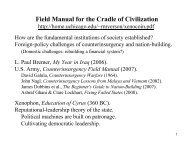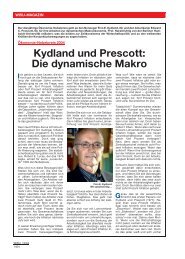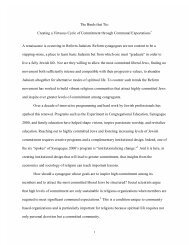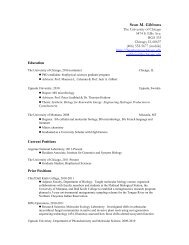Franz Boas and the Discovery of Culture - Personal Web Pages ...
Franz Boas and the Discovery of Culture - Personal Web Pages ...
Franz Boas and the Discovery of Culture - Personal Web Pages ...
You also want an ePaper? Increase the reach of your titles
YUMPU automatically turns print PDFs into web optimized ePapers that Google loves.
<strong>Franz</strong> <strong>Boas</strong> <strong>and</strong> <strong>the</strong> <strong>Discovery</strong> <strong>of</strong> <strong>Culture</strong> 19<br />
national union <strong>of</strong> <strong>the</strong> Burschenschaften. 47 Using a word he picked up from Marie, <strong>Boas</strong><br />
wrote that he had <strong>the</strong> “blues.” 48<br />
There were still no jobs in America, <strong>and</strong> so <strong>Boas</strong> settled on habilitation at <strong>the</strong><br />
University <strong>of</strong> Berlin. Habilitation turned out to be an excruciating process, as <strong>Boas</strong> had to<br />
spend a year writing his <strong>the</strong>sis, to satisfy Heinrich Kiepert, who was intent on not being<br />
satisfied. Kiepert was <strong>the</strong> only geographer at Berlin, <strong>and</strong> was stubborn <strong>and</strong> dry, strictly a<br />
physical geographer, with low regard for <strong>the</strong> new historical geography, <strong>and</strong> probably<br />
wary <strong>of</strong> <strong>the</strong> new, young competitor. Though Kiepert tried to block his entry, eventually,<br />
through <strong>the</strong> help <strong>of</strong> Kirchh<strong>of</strong>f <strong>and</strong> Bastian, <strong>Boas</strong> successfully defended his habilitation<br />
<strong>the</strong>sis, Baffin-l<strong>and</strong>, before a highly distinguished colloquium <strong>of</strong> thirty pr<strong>of</strong>essors,<br />
including Dil<strong>the</strong>y <strong>and</strong> Helmholtz. The pay for his position was low, however, <strong>and</strong> <strong>Boas</strong><br />
worked in <strong>the</strong> meantime as an assistant in Bastian’s museum. It was exciting work, <strong>and</strong><br />
<strong>Boas</strong> made friends among <strong>the</strong> young anthropologists that Bastian employed <strong>and</strong> trained.<br />
It was <strong>the</strong>re that he became interested in <strong>the</strong> Indians <strong>of</strong> British Columbia, as his job was<br />
to catalog a collection <strong>of</strong> <strong>the</strong>ir artifacts brought in by J. Adrian Jacobsen. He was struck<br />
by “<strong>the</strong> wealth <strong>of</strong> thought… hidden behind <strong>the</strong> grotesque masks <strong>and</strong> elaborately<br />
decorated utensils <strong>of</strong> <strong>the</strong>se tribes.” 49 Even more exciting was <strong>the</strong> troupe <strong>of</strong> Bella Coola<br />
Indians that Jacobsen brought with him. <strong>Boas</strong> spent his free time studying <strong>the</strong>ir dances<br />
<strong>and</strong> language. Their fascination was partly due to <strong>the</strong>ir not being Eskimos. He desparately<br />
wanted to move beyond his “eternal Eskimo,” 50 as <strong>the</strong> long struggle to write his book,<br />
much <strong>of</strong> which he tried to accomplish in his inadequate English, left him spent, <strong>and</strong> bored.<br />
<strong>Boas</strong> wrote an article about <strong>the</strong> Bella Coola troupe for <strong>the</strong> American Science journal, <strong>and</strong><br />
kept his fingers crossed, hoping for a new challenge.<br />
He decided to tour London <strong>and</strong> America before his lectures at Berlin were to<br />
begin, to look for better opportunities. He didn’t find jobs, but he managed to secure<br />
research work in <strong>the</strong> Pacific Northwest, with <strong>the</strong> aid <strong>of</strong> a loan from his uncle, Jacobi. And<br />
so, he canceled his lectures <strong>and</strong> left for <strong>the</strong> town <strong>of</strong> Victoria in British Columbia. Quickly,<br />
though, he was overwhelmed by <strong>the</strong> complexity <strong>of</strong> life <strong>the</strong>re, <strong>the</strong> sheer number <strong>of</strong> entirely<br />
different languages he would have to learn. In town, he met speakers <strong>of</strong> Tlingit,<br />
Tsimshian, Haida, Bella Coola, Kwakiutl <strong>and</strong> Salish. To acquire some artifacts in order to<br />
pay back his loan, he traveled north to a Kwakiutl village where some feasts were being<br />
organized. His primary organizational criterion was mythology, <strong>and</strong> so most <strong>of</strong> his work<br />
involved collecting stories. It was frustrating work, as his informants were not very<br />
talkative, for various reasons. One Comox woman even tried to invent a story to please<br />
him. 51 Never<strong>the</strong>less, <strong>Boas</strong> was relatively successful, due to <strong>the</strong> effort he made to follow<br />
local custom. Arranging his own potlatch won him much respect. He returned to New<br />
York with many rare artifacts, <strong>and</strong> three hundred edited pages <strong>of</strong> myths <strong>and</strong> stories,<br />
vocabulary <strong>and</strong> grammar tables. He also discovered a new Salish language, Petlatch. He<br />
hoped to use this collection to get a job as a museum curator, but none in New York<br />
seemed especially interested in anthropology exhibits. And <strong>the</strong>n, his luck changed.<br />
Science magazine <strong>of</strong>fered him a job as its Berlin correspondent, but <strong>Boas</strong> was wary <strong>of</strong><br />
47 Cole, p. 87<br />
48 Cole, p. 88<br />
49 Cole, p. 97<br />
50 Cole, p. 97<br />
51 Cole, p. 101


